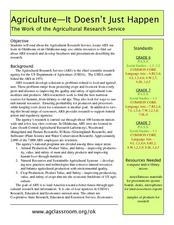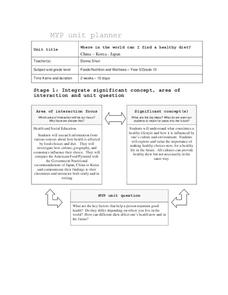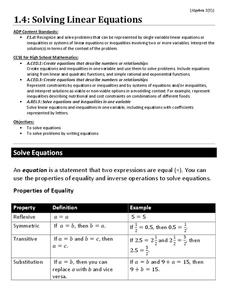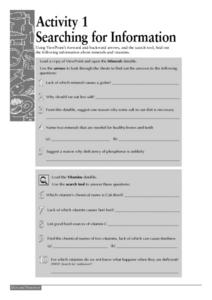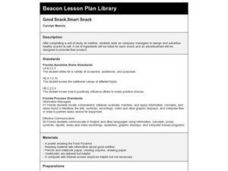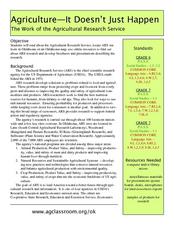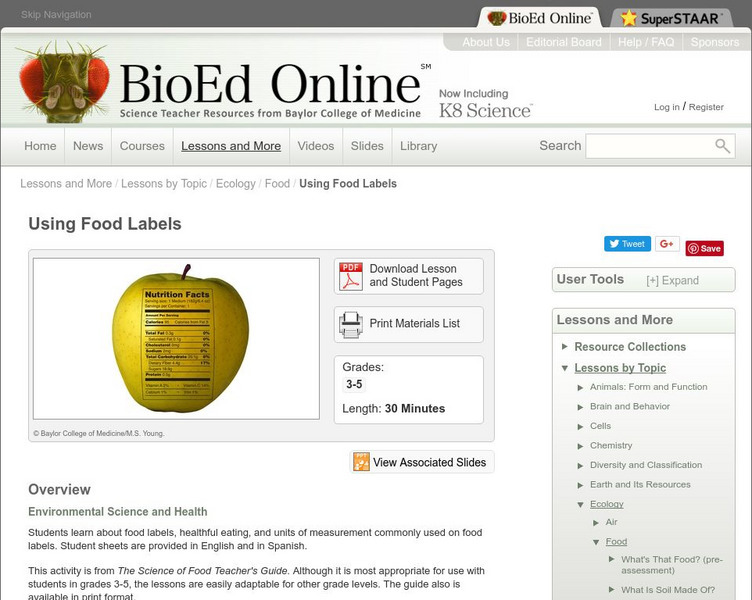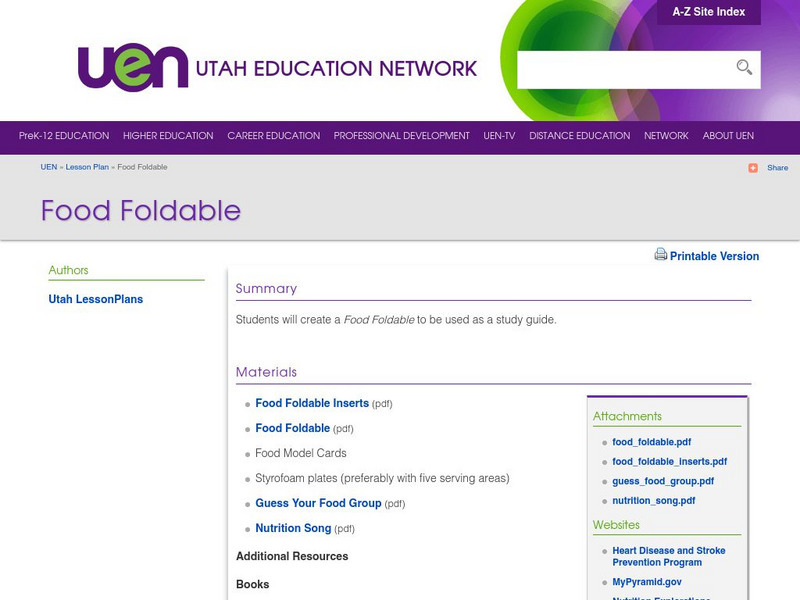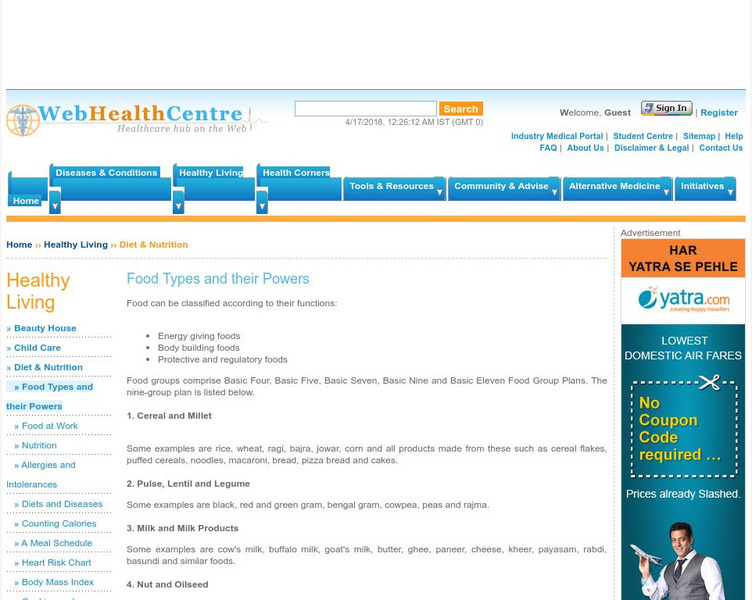Curated OER
For The Birds
Student make bird feeders and describe feeding behaviors. In this bird feeder lesson plan, students construct simple bird feeders. They then put them outside and observe the feeding behaviors of birds. Then they graph the number of birds...
Curated OER
Agriculture: It Doesn't Just Happen
After reading an informational text on the Agricultural Research Service, learners research the role of the ARS in Oklahoma. Using reputable online sources, they label a map of the state with relevant areas. Researchers focus on one of...
EngageNY
Complex Numbers and Transformations
Your learners combine their knowledge of real and imaginary numbers and matrices in an activity containing thirty lessons, two assessments (mid-module and end module), and their corresponding rubrics. Centered on complex numbers and...
Curated OER
Quinoa Pasta 3
A mixture of quinoa and corn is for dinner in this collaborative task that sets up nicely as a system of linear equations. Your supper guests discuss numerical precision and percentages as they formulate a plan of how to solve the problem.
Curated OER
DNA: Expressions in Agriculture
What is DNA extraction, and can you make a living doing it? Yes, if you are in a biotechnology field. Kids learn about DNA extraction, GMOs, and biotechnology careers. They then watch videos and complete activities to understand the use...
Curated OER
Quinoa Pasta 2
Learners discover that a system of linear equations models this mixture of quinoa and corn in a collaborative task. Your learners receive all the relevant information in this second of three variants of tasks that ask them to find...
Curated OER
Bread in a Bag
This lesson focuses on making bread, but also spends some time on the origins of wheat. In order to make the bread, each class member receives a kit full of the materials they will need. Included here is a detailed list of instructions...
Ohio State University
Where in the World Can I Find a Healthy Diet?
What constitutes a healthy diet? In what way is a healthy diet defined and influenced by culture? Groups investigate the community and national resources available in a country, and then design a healthy diet for its citizens.
Curated OER
Solving Linear Equations
Use this activity for practice or review solving linear equations in one variable. Problems range from multiple-step problems involving parentheses and combining like terms, to word problems, to equations with no solution or infinitely...
Curated OER
Consumerism - Grocery Shopping
Students watch a video on how marketers plan their strategies in supermarkets. In groups, they are given a set amount of money and asked to go through a grocery store simulation with a list. After the simulation, they discuss the...
Curated OER
Searching for Information
For this computer worksheet, students use ViewPoint's forward and backward arrows, and the search tool to locate information given about minerals and vitamins. They load the Vitamins datafile and use the search tool to respond to five...
Curated OER
Human Population Growth
For this human population growth worksheet, students create a graph of human population growth and predict future growth using the data given in a chart. Students identify factors that affect population growth.
Curated OER
Good Snack,Smart Snack
Second graders pretend to be company managers who design and advertise healthy snacks to sell.
Curated OER
Snacks 'R Us
First graders experiment with fat content by analyzing snack foods. They learn what makes up a nutritious snack.
Curated OER
Nine Examples for Tables, Pictographs, Mean. Median, and Mode
In this graphical representation of data and measures of central tendency worksheet, students calculate mean, median, and mode and answer questions related to graphs, tables, and pictographs.
Curated OER
Agriculture - It Doesn't Just Happen
Sixth graders examine the role of the US Department of Agriculture. For this United States Agriculture lesson, 6th graders create maps with sites and specialty areas. Students create a presentation on the topic they were given to...
Curated OER
Calories, Energy for Exercise and Life
Students calculate the number of calories they need daily and examine the impact of exercise on their caloric needs. They then determine if their daily caloric intake meets or exceeds their daily need.
Curated OER
Grocery Shopping
Pupils apply budgeting and shopping strategies. They study consumer shopping skills and guidelines to be a better shopper by comparing stores, comparing prices and unit pricing, brands, using coupons and not being fooled with gimmicks...
Curated OER
Ocean Market
Students identify some consumer goods that come from the ocean.
They classify these items into groups, identify their source, and calculate the cost of buying such goods.
BioEd Online
Bio Ed Online: Using Food Labels
Do you know how to read a food label? Food labels provide important information about the nutritional value of foods. In this lesson plan students will learn about food labels, healthful eating, nutrition facts, and units of measurement...
Utah Education Network
Uen: Food Foldable
During this lesson plan, students will listen to a poem about a balanced diet and create a foldable. In each section of the foldable, students will include information about a different food group and will use this creation as a study...
Other
Kids' World Nutrition Information: Understanding Food Labels
In order to plan a healthy diet, students must know how to read a food label. Food labels show that a food has a little or a lot of certain nutrients. Look on the side of a product to find the Nutrition Facts title, which is fully...
University of Illinois
University of Illinois Extension: Food for Thought: Bread, Cereal, Rice, and Pasta
In addition to explaining the nutritional value of foods in the "Bread, cereal, rice, and pasta," group, this website includes information on serving size and book resources on foods in the bread group. Also included is a recipe for...
Other
Web Health Centre: Food Types and Their Powers
This website describes the nutritional values of different types of foods. Learn what types of foods are sources of carbohydrates, proteins, fats, vitamins, and minerals through a chart provided at the bottom of the page.

